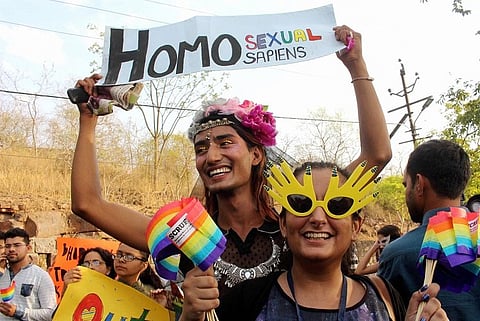

In a landmark judgement on Thursday, the Supreme Court declared that privacy is a fundamental right. While the verdict has far-reaching implications for all citizens of the country, it has opened a window of hope for the LGBTQ+ community in India.
Among many other issues, four judges of the nine-judge bench, raised the possibility that Section 377 (which criminalises all forms of sex other than penile-vaginal) could be decriminalised on the grounds that it violated privacy rights of members of the LGBTQ+ community.
An opinion by Justice DY Chandrachud, which was signed by three more judges, stated that sexual orientation is an essential component of privacy, and the sexual orientation of every individual had to be protected equally.
"Sexual orientation is an essential attribute of privacy. Discrimination against an individual on the basis of sexual orientation is deeply offensive to the dignity and self-worth of the individual. Equality demands that the sexual orientation of each individual in society must be protected on an even platform. The right to privacy and the protection of sexual orientation lie at the core of the fundamental rights guaranteed by Articles 14, 15 and 21 of the Constitution," reads the opinion by Justice DY Chandrachud, signed by three more judges.
The target of the opinion by the four judges is the contentious Suresh Kumar Koushal vs Naz Foundation judgement, which overruled the Delhi High Court’s judgement decriminalising section 377. The opinion said that the judgement was wrong in suggesting that the rights of LGBT persons were illusory, and asserted that these rights were real and based on sound constitutional doctrine.
"The view in Koushal that the High Court had erroneously relied upon international precedents 'in its anxiety to protect the so-called rights of LGBT. persons' is similarly, in our view, unsustainable. The rights of the lesbian, gay, bisexual and transgender population cannot be construed to be 'so-called rights'. The expression 'so-called' seems to suggest the exercise of a liberty in the garb of a right which is illusory. This is an inappropriate construction of the privacy based claims of the LGBT population. Their rights are not 'so-called' but are real rights founded on sound constitutional doctrine. They inhere in the right to life. They dwell in privacy and dignity. They constitute the essence of liberty and freedom. Sexual orientation is an essential component of identity. Equal protection demands protection of the identity of every individual without discrimination," the opinion read.
Hailing the opinion as a welcome step, Anjali Gopalan – who founded the Naz Foundation that fought the case against Section 377 in court – said that it will have far-reaching consequences on several levels.
"It will definitely impact Section 377, because the Delhi HC judgement (2009) too had included the right to privacy as a very crucial issue when it decriminalised homosexuality," she said.
She added the hope that the SC’s affirmation of the right to privacy will prevent incidents like the 2010 death of Professor Shrinivas Ramchandra Siras from Aligarh Muslim University. Siras had been humiliated and suspended from his job after a media crew secretly burst into his quarters and filmed him having sex with another man. He had finally ended up committing suicide.
"He ended up committing suicide because his colleagues got the media to enter his house and film him. A judgement like this will ensure that people are not violated in this manner and are protected. I am so happy that this judgement has happened," Anjali said.
Gopi Shankar, an intersex person from Madurai, said that the right to privacy judgement was a "historic" judgement, which will help ensure that a person has a basic right to their body.
"It should ideally make us rethink the restrictions placed on one's bodily integrity," ze (Gopi's preferred pronoun) says.
When it comes to the intersex community especially, Gopi said that their gender identities are not even recognised. "We are told to be either as a man or a woman. While the government recognises the third gender (transgender persons), it is not enough, because many intersex persons do not identify as trans," Gopi said.
In this context, ze stated that this judgement, and the observations made in it, can be used as a premise to protect the birth identity of intersex babies. "If one day the government comes up with a separate law protecting intersex rights, this judgement will help protect privacy of a person assigned as intersex at birth," ze said.
Grace Banu, a trans woman and activist, said that the opinion expressed by the four judges raised the possibility of protecting trans persons who are sex workers.
"Section 377 has often been used to target the transgender community, especially those who are sex workers, and accused of having 'unnatural sex'. This judgement should protect their privacy," she said.
Bittu Karthik, a scientist and transgender activist, appreciated the opinion expressed by the four judges, but pointed out the gap from this opinion to the decriminalisation of Section 377.
"I commend the broad principles outlined in this opinion, validating the application of the Constitutional rights to privacy and life to the right to sexual orientation as an essential component of identity. However, Section 377 criminalises not sexual orientation but sexual acts, and the question is whether this judgment could be brought to bear on sexual acts, especially in public physical spaces because that where consenting adults, who are mostly working class, can be prosecuted under Section 377,” he said.
“The other realm in which we find Section 377 applied is when transwomen and kothis have been raped try to file a complaint, the police threaten to file Section 377 on both the victim and perpetrator both because there is no other section of law protecting trans and male victims of rape, and because the questions of consent and power are completely ignored by the framework of Section 377,” he added.